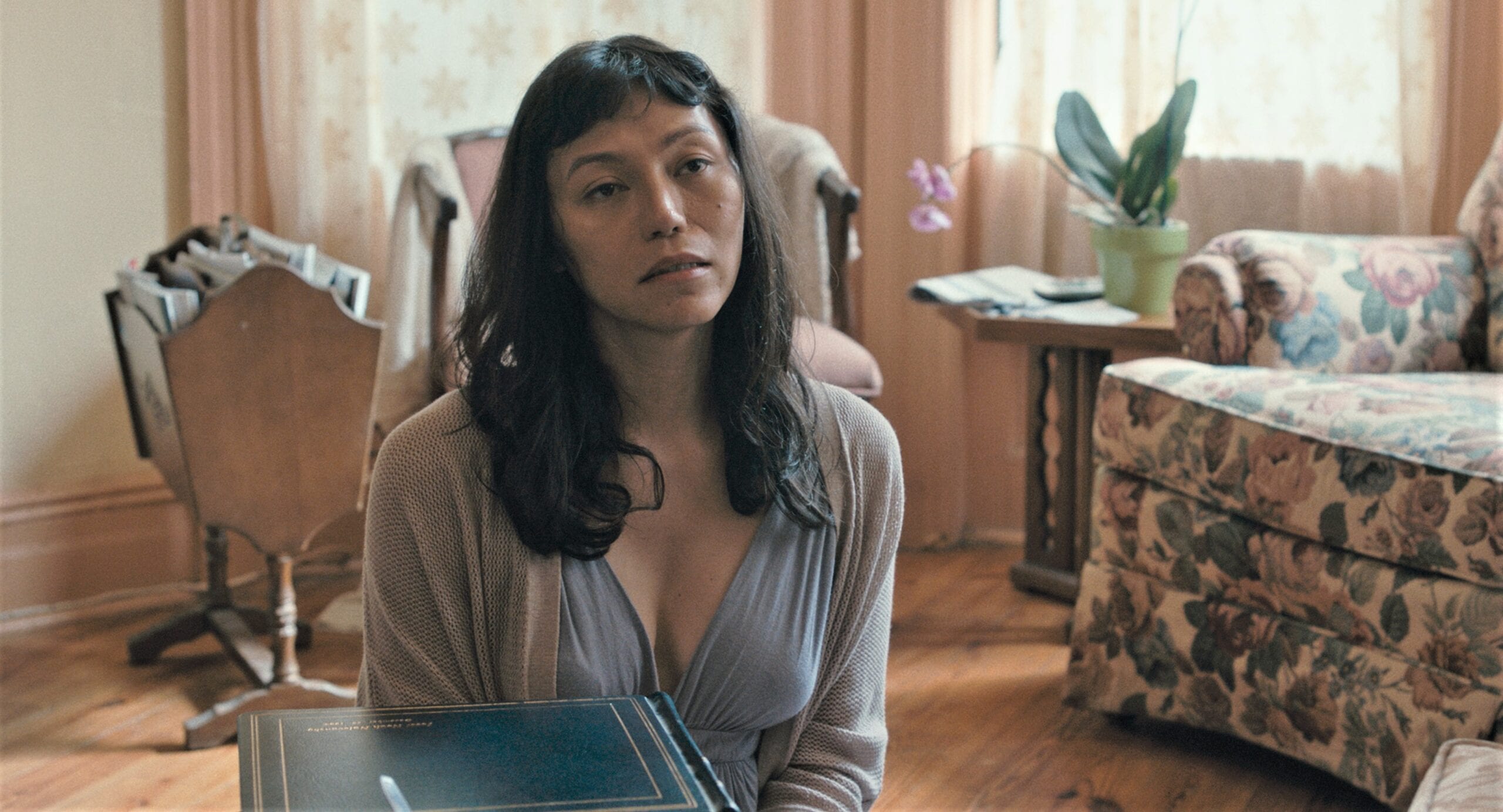Filmmaker Isabel Sandoval is unapologetic about calling herself an “auteur.” When she says so during our recent interview, I’m struck by her audacity; the term is most often reserved for white cis men. A trans Filipina intentionally inserting herself into such a lexicon is the type of transformation this industry truly needs.
“As an auteur, it’s very important for me to have authorship of my film, both in front of and behind the camera,” she says. “Not only did I act in it and direct it, I also wrote it, am one of the producers and I edited the film. I wanted to have true authorship and creative autonomy over the film that I’m trying to make, to make sure that I achieve my vision faithfully and without any compromise.”
Lingua Franca, set for release on Netflix August 26 via Ava DuVernay’s distribution company, Array, centres an undocumented Filipina trans woman named Olivia (played by Sandoval) who is the live-in caregiver for an elderly Russian woman in Brooklyn’s Brighton Beach neighbourhood. Following Olivia’s journey to secure a green card to stay in Donald Trump’s America—during which she becomes romantically involved with her care receiver’s adult grandson, Alex (Eamon Farren)—the film could easily become gauche, sensational and unnecessarily didactic. What Sandoval has created, however, is a sensual and unflinchingly frank exploration of trans survival, and a necessary interrogation of the psychological impacts of inhumane immigration policies.
Lingua Franca is Sandoval’s third feature film, but the first to be shot and produced in the United States. Her first two, 2011’s Señorita and 2012’s Apparition, were filmed in the Philippines and landed her recognition by the Museum of Modern Art as a “rarity among the young generation of Filipino filmmakers for her muted, serene aesthetic.”
I caught up with Sandoval in advance of the film’s release. We spoke about the inspiration behind—and timeliness of—her latest film, the importance of the trans female gaze in stories about trans women and refusing to be pigeonholed as a trans woman of colour filmmaker.
Talk to me about your motivation behind the film.
I’ve always been drawn to stories of women who are either marginalized or disempowered and who find themselves confronting very personal and private issues within a fraught sociopolitical setting. Lingua Franca is no exception. I actually started writing the script while I was transitioning, and was about halfway through when Trump got elected. I was feeling, just like a lot of people and minorities, a lot of anxiety, vulnerability and uncertainty about my situation. I kind of channelled that emotional state into what would be the mood or temperament of Lingua Franca.
Making a film that’s partly about citizenship and immigration is inherently political, and to do that as a trans woman yourself takes it to the next level.
I am a trans woman of colour who’s also an immigrant in the U.S. I joke to my friends that I feel like I’m a gold star minority in that sense. And because I don’t experience a certain type of privilege with regards to race and gender, I feel the lack of that privilege more acutely and more keenly. That informs the setting and the milieu of Lingua Franca—these are not issues that I can just ignore in my work because I do feel them palpably in my life. I guess that’s really the value of having a story about a woman like Olivia written by someone who’s also a trans woman of colour and immigrant because there is truly a lived-in authenticity in the perspective of the film.
We’re in the middle of a presidential election cycle. Do you have any hopes about how Lingua Franca might be able add to the conversation around immigrant rights, citizenship and trans rights?
My style is that I’m not a preachy or didactic type of filmmaker, and I don’t have people watch my films so that they can reinforce their preconceived notions about a particular issue or theme. But my film is an invitation to think about someone like Olivia and the themes that the film touches on, like immigration and the transgender experience, more deeply and more critically. The film doesn’t provide fast and easy answers to these issues, but it asks what I hope are complex, thoughtful and provocative questions about the way we live now.
Does casting yourself in the lead make directing any easier?
Auteurs tend to write [themselves as a] protagonist in their films as a kind of alter ego or double. It’s not autobiographical, but I do have a kind of emotional and psychological kinship with someone like Olivia because we’re both trans women of colour and immigrants. And I know that it seems unexpected or surprising to say this, but I actually do find it easier if I act in the film because I think of it as one less person to direct. Directing is a lot like conducting an orchestra; the different crew members are the musicians, and you have to make sure that they’re playing the music right or they’re on the same page as you. By taking on these multiple roles (which I don’t necessarily consider different jobs because I have one job and that is to make a film and tell a story), I feel like it’s just easier for me to get to the final film that I’m trying to make.
In addition to the main story about immigration and citizenship, there’s also this unexpected love story of sorts weaved into the film. Why was it important for you to show what love can look like for a trans woman?
Apart from romantic desire, I also wanted to depict and portray the sensuality of a trans woman and the trans female gaze. There are two of these central scenes in the film. The first one is a fantasy sequence where she’s fantasizing and desiring this man. I think it’s pretty radical and subversive, especially in American cinema because we rarely see scenes of women not being the object of desire but actually being an agent [that is] desiring. And also watching a woman like Olivia experience that pleasure without apology. And even in the second scene, the actual love scene, I didn’t want to just depict and show images of naked bodies gyrating against each other. The camera stays on her face for both of the scenes; it’s set up as a love scene, but it’s a character scene where she’s allowing herself to experience sexual pleasure. She’s also beginning to realize the repercussions or the implications of becoming intimate with a man who isn’t aware yet that she’s transgender. In a way, I wanted to make that scene feel layered and complex, and even ambivalent in some sense. That’s how I’m trying to approximate real life in terms of how I’ve felt about it.
With the release of this film, you’re part of a moment in which the broader industry is amplifying diverse voices. There often is a tendency, I feel, for tokenization and pigeonholing in terms of what trans folks and Black and brown folks are able to do. Is that something you think about?
Absolutely, especially because I’m a minority filmmaker who’s trying to get my foot in the door and navigate an industry like Hollywood, which tends to pigeonhole, essentially telling you, “Okay, so your trans. These are the only kinds of stories that you can tell.” I want the industry to recognize that filmmakers like myself are more than our markers of identity, that we have our own unique aesthetics and sensibilities.
I’m a storyteller and I’m being very strategic and pragmatic about the kinds of projects that I take on. Although it’s not my biggest dream, eventually I want to be considered and even take on a job directing a superhero movie, for instance. My next feature that I just finished writing is a surreal colonial drama set in the 16th century. I’m trying to leverage the recognition that Lingua Franca is getting to take on more ambitious creative projects and films. I want to make sure, at least in terms of my career, that this doesn’t just seem like a token effort on the part of Hollywood, and that they can truly see that queer filmmakers, trans filmmakers, are talented and that we can work on projects that are not necessarily always just about the trans experience. Because, after all, we are people.


 Why you can trust Xtra
Why you can trust Xtra


